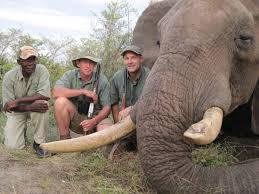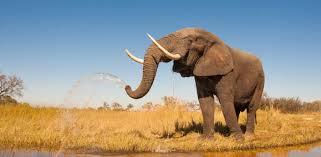Take a memo to the lions. And cc the elephants.
Don't resent that guy with the gun pointed at you. In the long run, he's your best pal.
This may not provide much consolation to the late Cecil the Lion, but the host of Carter's W.A.R., a popular show on The Outdoor Channel, explained to TV writers in Pasadena Tuesday that big-game hunting is the best thing that can happen to many big game species.
"The statistics will show," Ivan Carter said, "that in areas with well-managed sustainable hunting, the wildlife proliferates. The wildlife populations go through the roof."
Carter (center above), who describes himself as a hunter, a conservationist and a wildlife investigator, spends much of the show, which airs Mondays at 9 p.m., traveling through Africa examining wildlife issues at the community level.
In one episode, he is asked by a village to kill a hippopotamus that reportedly has been attacking people. He's not particularly looking to shoot a hippo, he says, but he's concerned that if he doesn't isolate and eliminate the perp, the villagers will kill all the local hippos.
His problem: He finds a wetland where hippos gather and, frankly, they all look alike. Lots of water. Lots of hippo eyes just above the surface. None of them makes an aggressive move.
That's the kind of thing he does in his wildlife investigating, and that's the kind of real-life concern he uncovers.
But he said he also spends a lot of time linking all these local matters together into the larger picture of wildlife conservation and survival in a world where humans are claiming an increasing amount of the territory once available to other species.
Purely on the most practical level, he said, hunting has two irreplaceable benefits. First, it helps keep populations at manageable levels. Second, the money paid by hunters to kill big game is a major source of funding for conservation programs, including anti-poaching campaigns.
"I'm not asking you to hunt," Carter told TV writers. "I'm not asking you to believe in hunting. What I'm asking you to do is to understand the business model whereby if enough people come onto the front line and pay enough money, the survival of the species becomes the major and the most overwhelming effect of what actually happens."
It's a familiar discussion, echoed with variations in American communities that fear they may have too many deer or black bears roaming through suburban subdivisions.
But Jim Liberatore, president and CEO of The Outdoor Channel, thinks the discussion lately has become imbalanced, thanks in part to coverage of dramas like Cecil the Lion.
"There is an untold story in this country," said Liberatore, "and that's why I think this is important. From a westerner perspective, everyone says, 'Oh, my gosh. This is horrible. They're killing endangered animals.' That's not what's happening."
"Hunters and poachers are two different animals. When hunters are on the scene, poaching goes down. And that's why the hunting story is a conservation story."
"If I'm a poacher," says Carter, "I'm going to go into an area irrespective of age, sex, species and I'm just going to kill as much as I possibly can to get as much money as I can.
"If I'm a hunter, I'm going to go in there with a tag and a predetermined patch of land which has got a predetermined quota of what a healthy off-take would be and I'm going to go in there with the intention of a very specific species, a very specific sex and probably even a very specific animal. I'm going to take that all in way that's as humane as possible, in a way that's very sustainable to be future generations."
Carter acknowledged that many species, like white rhinos, face a survival crisis. Poachers have killed much of the population because, in the case of rhinos, there's an enormous market for powdered rhino horn -- which is believed to have near-magical powers in some cultures despite all scientific evidence to the contrary.
The only solution there, he argued, is "education, education, education" -- convincing consumers that there's no value in the product. Or, with elephants, "making people in China believe that the most important thing is not to have an ivory carving on your mantelpiece."
Bringing about those changes, he admitted, may be a long shot. But it's the only shot -- and the odds get better, he argues, if we let hunters supply some of the funding.


